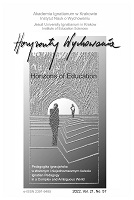Towards a Model of Formation in Identity and Mission of the Collaborators of the University Centers of the Society of Jesus: Dreaming the Future
Towards a Model of Formation in Identity and Mission of the Collaborators of the University Centers of the Society of Jesus: Dreaming the Future
Author(s): Vicente Hernández‑Franco, Elisa María Pérez Avellán, Henar Pizarro LlorenteSubject(s): Christian Theology and Religion, Education, Vocational Education, Pedagogy
Published by: Uniwersytet Ignatianum w Krakowie
Keywords: Ignatian Pedagogy; Ledesma-Kolvenbach; Jesuits universities; Indentity and Mission model; Vocational lifelong learning;
Summary/Abstract: RESEARCH OBJECTIVE: The main objective of our work is to offer a conceptual model that allows us to base, discuss and systematize a formation itinerary in Identity and Mission, from the keys of Ignatian Pedagogy, for the collaborators of the University Centers of the Society of Jesus. THE RESEARCH PROBLEM AND METHODS: The research problem has been designed as the following question: How can it be systematized a formation itinerary in Identity and Mission for the collaborators of the universities of the Society of Jesus? It should be addressed from the keys of Ignatian Pedagogy and in order to its educative tradition. To answer it, it has been applied an analytical and synthetic method of the literature approach to the subject. THE PROCESS OF ARGUMENTATION: Based on the university educational tradition of the Society of Jesus, the so-called “Ledesma-Kolvenbach Paradigm” is conceptualized. This Paradigm synthesizes the keys of Ignatian University Pedagogy. Based on this theoretical framework, a conceptual model of formation in Identity and Mission of collaborators the universities of the Society of Jesus is proposed and argued. RESEARCH RESULTS: A conceptual model of six dimensions, interrelated in a dynamic and systemic manner, is offered. These are classified into two levels, “Identification with the University Project” and “Commitment to the Mission,” depending on the degree of assimilation and accommodation of the collaborators. Also, for each dimension, a series of question are proposed which allow the structuring of different training experiences. CONCLUSIONS, INNOVATIONS AND RECOMMENDATIONS: Aformation of the collaborators, based on the keys of Ignatian Pedagogy, is necessary to keep alive and updated the Identity and Mission of the universities of the Society. For this reason, it is crucial to have a consistent model, that systematizes this formation process, in accordance with the educational tradition of Jesuit Universities.
Journal: Horyzonty Wychowania
- Issue Year: 21/2022
- Issue No: 57
- Page Range: 81-94
- Page Count: 14
- Language: English

